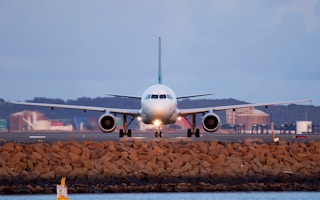A deal on limiting carbon dioxide emissions from aviation will likely be reached next year, no matter the outcome of this week’s climate change talks in Paris, a senior official from the International Air Transport Association (IATA) said on Thursday.
The aviation industry is not covered by the United Nations climate talks currently being held in Paris because it is organised under a separate U.N. body, the International Civil Aviation Organization (ICAO).
The latest draft of the climate change pact, released Wednesday, dropped any mention of aviation or shipping, although officials from Europe said they were working hard for a paragraph encouraging nations to curb the carbon output of these two industries to be put back in.
ICAO is working on options for a market-based system to enable airlines to reduce emissions by buying carbon offsets or allowances, plus a global CO2 emissions standard for aircraft. The organisation hopes to unveil the market-based system at a meeting next September.
“There is genuine momentum building behind the ICAO process and we’re confident there will be a successful outcome at ICAO Assembly,” Michael Gill, Director Aviation Environment at IATA, told journalists in Geneva.
Gill said among the main sticking points were how airlines would measure and report their emissions, and how the scheme would take into account the different rates of economic development both of countries and their airlines.
Gill, who had flown to Geneva for an IATA briefing to journalists from Paris and was returning to the talks, said there was a general sense in Paris that things were “in good shape” for a global agreement on climate change.
IATA expects an agreement on the stringency and the applicability of the CO2 standard to be reached by governments in February, Gill added.










